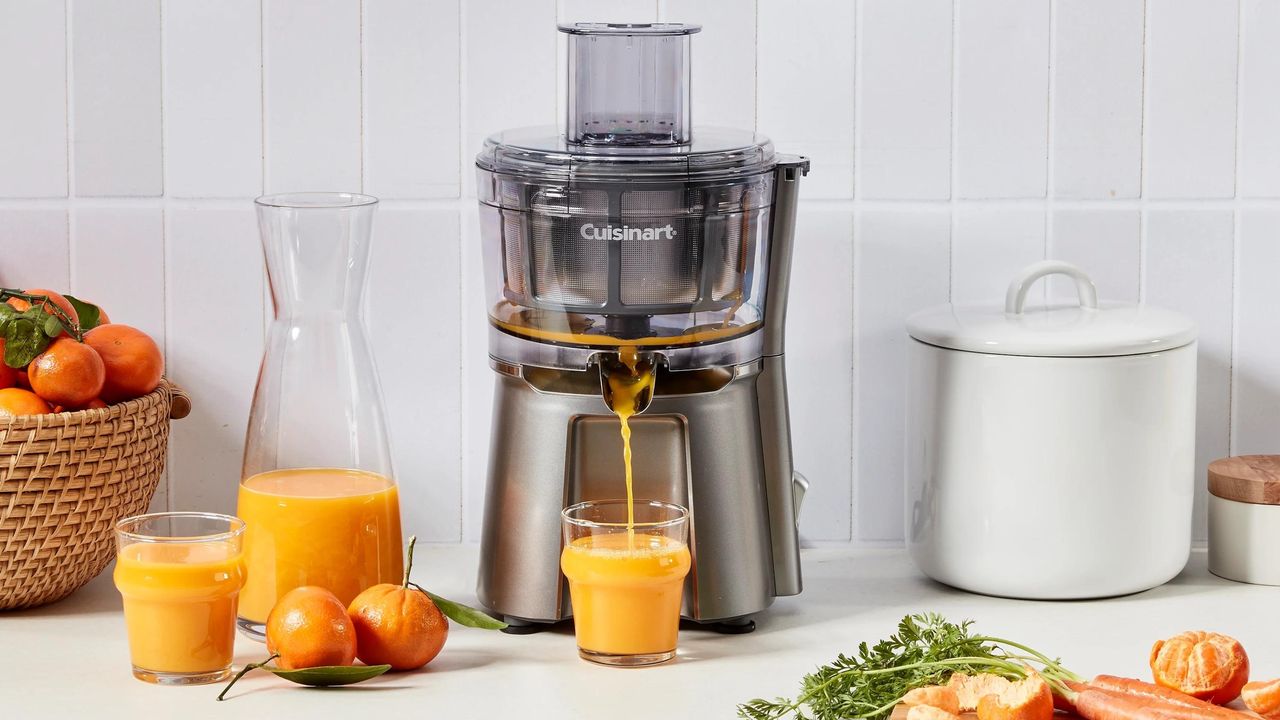

Best Citrus Juicers: Quick Menu
Investing in the best citrus juicer will help you streamline the juicing process. Soon enough you'll be making fresh orange juice, lemonade, cocktails, and more at home.
Find everything you need to know before purchasing a citrus juicer. We explain what to consider such as noise, material, and ease of cleaning. Plus, we'll help you figure out if a manual or electric option is best for you.
To find the best juicer for your home, we tested eight products from popular brands, with six making our list. After juicing dozens of oranges, carefully tracking the results, and upping our Vitamin C levels in the process, we found the best citrus juicers for delicious freshly squeezed juice.
6 of the best citrus juicer models
Why you can trust Real Homes
Whether you want freshly squeezed orange juice in the morning, lemon juice for your hummus, or in need of refreshing lime juice for your margaritas — all of this can be achieved with a good citrus-juicing small kitchen appliance.
In each of the review listings below, we've included the price, type, and capacity so you can make the right decision based on your kitchen setup, budget, and abilities.
Citrus juicer reviews
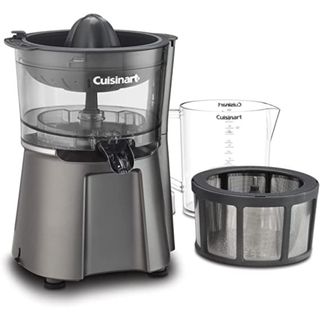
Price: $179.95
Type: Automatic
Weight: 12.9lbs
Capacity: 28oz
+ 2-in-1 design
+ Extremely fast and efficient
+ Adjustable pulp strainer
+ Two-speed settings
- Bulky and heavy
We absolutely loved the high-powered performance of the Cuisinart Combo Citrus Juicer — it worked the fastest of all the models we tested, juicing oranges right down to the rine in a matter of seconds. It has three pulp settings, as well as two different speeds, and it comes with a 28-ounce carafe with measurement markings and an easy-to-pour design.
This unit also stands out from the rest because it does double duty as a juice extractor. It comes with a grinding disc and micromesh basket, allowing it to be used as a centrifugal juicer for other types of produce. However, it has an extremely high price point of $180, is quite bulky to store, and would likely be overkill for casual juicing.
Real Homes rating: 4.5 out of 5 stars
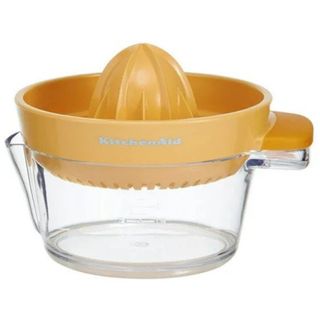
Price: $9.97
Type: Manual
Weight: 0.91lbs
Capacity: 18oz
+ Sharp reamer extracts juice easily
+ Dishwasher safe
+ Non-slip bottom
Despite being a manual model, the Kitchenaid Citrus Juicer came out on top in terms of both performance and value during our testing. It has a compact, lightweight design that would be easy to store in your kitchen, and we were super impressed by its sharp reamer, which extracted lots of juice with only minimal pressure. The non-slip bottom stayed in place on the counter, and we loved that the base has measurement markings on the sides — super helpful when you need a certain amount of juice for a recipe.
The strainer holes were able to stop bigger pieces of pulp without getting clogged, and when we were done testing, we were able to put both the top and bottom right into the dishwasher for hands-off cleaning. It doesn’t get easier than that!
Real Homes rating: 5 out of 5 stars
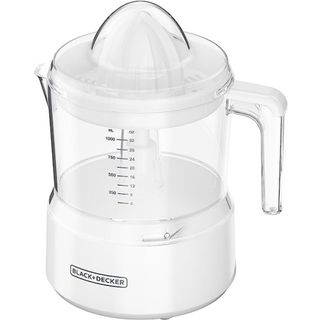
Price: $25.99
Type: Automatic
Size (in): H8.9 x W6.4 x D6.4
Weight: 1.75lbs
Capacity: 32oz
+ Adjustable pulp strainer
+ Convenient cord wrap
+ Dishwasher safe
- Reamer must be removed before pouring
Despite being a budget-friendly pick, the Black +Decker Citrus Juicer actually boasts the largest juice container of all the models we tested. It’s able to hold up to 32 ounces of juice in its lower chamber, which means you can juice more in one session. We also loved its sharp reamer, which automatically reverses with each push and has sharp fins that get right down to the rind of your citrus.
This juicer has an adjustable pulp strainer, though we found that it can be a bit challenging to adjust. You also have to remove the reamer before pouring which may get a little messy. There’s a cord wrap on the bottom of the appliance that allows it to be stored compactly, and the components are dishwasher-safe for easy cleaning.
Real Homes rating: 4 out of 5 stars
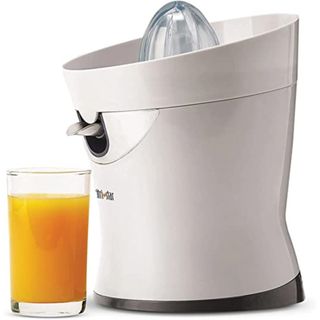
Price: $49.95
Type: Automatic
Weight: 5.6 lbs
+ Works extremely quickly
+ Two reamer sizes
+ Locking spout
+ Convenient cord wrap
- Not dishwasher-safe
If you have a lot of oranges that need juicing, the Citristar Citrus Juicer is one of the most powerful electric models we tested. It’s larger and heavier than other models, and its reamer spins extremely fast and extracts juice from oranges in a matter of seconds. The juicer comes with two different-sized reamers, depending on what fruit you’re working with, and it has a locking spout that lets you keep the juice in the unit until you’re ready to pour.
Unlike other juicers, this model doesn’t come with a carafe, but we found it easy to have it dispense juice into a measuring cup. (Plus, that just means one less piece to store.) It has a handy cord-wrap in the base of the unit that makes for compact storage, but you will have to hand-wash the components of this juicer, as they’re not dishwasher safe.
Real Homes rating: 4 out of 5 stars
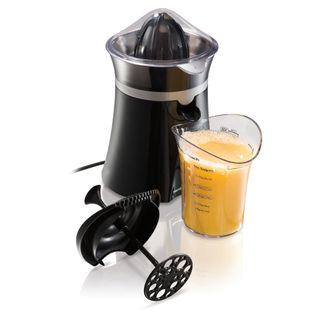
Price: $19.98
Type: Automatic / Manual
Weight: 5.31lbs
Capacity: 16 oz
+ Two reamer sizes
+ Electric or manual juicing
+ Pulp-straining carafe lid
+ Includes a mixer for salad dressings
+ Dishwasher safe
- Not the most powerful
For those who prefer orange juice without any pulp, the Hamilton Beach FreshMix Citrus Juicer has two straining mechanisms. Pulp is removed by a metal strainer underneath the reamer, and the carafe has a special straining lid that removes any pieces that might have gotten through initially, resulting in pulp-free juice.
We liked that this juicer has two reamer sizes for different types of fruit, and you can even attach the reamer directly onto the carafe if you want to manually juice. All its detachable components are dishwasher safe, but the juicer isn’t quite as powerful as the Citristar or Cuisinart models, so it took a bit longer to juice each orange half.
Real Homes rating: 4 out of 5 stars
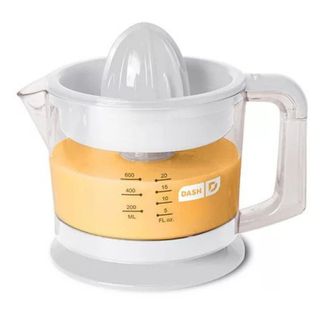
Price: $19.99
Type: Automatic
Weight:1.9lbs
Capacity: 25oz
+ Compact design
+ Two reamer sizes
+ Removable pulp filter
- Requires a lot of pressure
- Cheap construction
The Dash Citrus Juicer is compact and it comes in several fun colors. The electric design features two reamer sizes and an adjustable pulp filter, allowing you to select how much you want in your drink. You can even remove the filter altogether, which is ideal for those who want as much pulp as possible. However, we did find that this juicer isn’t the most powerful — the reamer spins fairly slowly, and you have to press down quite a bit to extract juice from your produce.
This juicer has a 25-ounce cup on the bottom, and it’s clearly marked with measurements so you can see exactly how much juice you have. The reamer automatically reverses direction every time you press down, helping to prevent clogs, and we liked that you can pour right out of the container thanks to its spout and handle.
Real Homes rating: 4 stars out of 5
What to consider
1. Manual or electric? When selecting a citrus juicer for your kitchen, you’ll want to think about how you plan to use it and how much you’re willing to spend. If you only ever juice one or two oranges (or other citrus fruits) at a time, a manual juicer is an efficient option that won’t cost too much. On the other hand, if you juice in bulk, a powerful electric juicer will make it quick and easy to juice dozens of pieces of fruit. However, these electric models tend to cost a bit more, and they’re also larger, taking up more space in your kitchen.
2. How loud is it? Whether you're starting the day with a glass of OJ, or hosting guests, no one wants a juicer that's disruptive. Obviously, you won't have this problem with a manual juicer as it relies on elbow grease, but electric versions will have a motor that does make noise.
3. Ease of cleaning: No one wants sticky hands and worktops when preparing juice. So evaluate the design of the citrus juicer and see whether it has an easy-pour spout and removable parts that separate the juice from the pith, skin, pulp, and seeds.
4. Material: As a society, we've become a lot more conscious of what our food-prepping tools are made from. If choosing something that's made from plastic, we'd sway towards the BPA-free kind. And, if you're going for glass, borosilicate glass tends to be stronger.
Other citrus juicers we reviewed
Not all of the citrus juicers that we reviewed made it to our "best" list. For the models we gave less than four stars, you can find what we thought about them here.
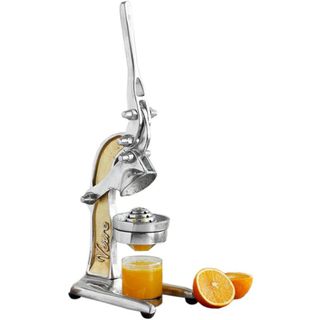
Type: Manual
Price: $98 (small)
Size (in): H12 x W5 x L12
Weight (lb): 5.66 lbs
Capacity (liters): 0.3L
+ Aesthetic handmade design
+ Made from 100% recycled aluminum
+ Washable components are easy to hand wash
- Large fruit is hard to juice
- No manual
- Easy to drop
- Base doesn't feel stable (buckles when juicing)
- Juices center but not the rim of fruit
- Not dishwasher safe (hand wash parts only)
While we were totally in love with the Mexican story and heritage on the packaging, this manual juicer fell a little flat in terms of performance. Generally speaking, with all of the citrus juicing tests we did (with limes lemons, and oranges), we had a 33% yield on lemons, 60% yield on oranges, and 72% on limes.
Real Homes rating: 3 out of 5 stars
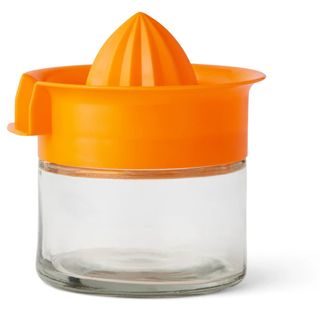
Type: Manual
Size: 4.75 x 4.5 x 5.5
Weight: 1.1 pounds
Capacity: 10 oz
+ Very inexpensive
+ Extremely compact
+ Glass base
+ Dishwasher safe
- Not very effective
- Strainer gets clogged
The Mainstays Citrus Juicer is as affordable as it gets, but it’s not the most efficient option, making it best-suited for smaller jobs. It has a plastic reamer that screws onto a glass base, and we found that you do have to apply quite a bit of pressure to extract juice from an orange with it. Further, the strainer’s holes clog up with pulp quite quickly. However, we liked that this juicer is dishwasher-safe, and it’s compact, and lightweight, making it ideal for small kitchens.
Real Homes rating: 3 out of 5 stars
Where to buy a citrus juicer
Citrus juicers are a popular household item, not just in America, but across the globe. Here are some of the best places to buy one from:
- Amazon citrus juicers
- Breville citrus juicers
- Crate & Barrel citrus juicers
- Cuisinart citrus juicers
- Hamilton Beach citrus juicers
- Ninja citrus juicers
- Nordstrom citrus juicers
- Nutribullet citrus juicers
- Smeg citrus juicers
- Target citrus juicers
- Walmart citrus juicers
How we test
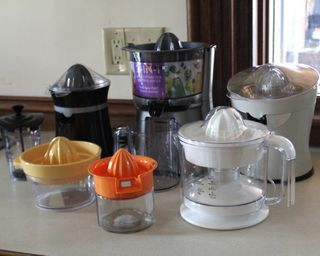
To find the best citrus juicer, we bought several pounds of oranges and got to work juicing. After setting up each juicer, both testers used each one to extract the juice from three oranges, taking note of how much juice it yielded, how easy it was to use, and how well it removed pulp. They did this by weighing an orange on a kitchen scale, juicing the fruit, and then placing the spent rind onto the measuring appliance to see how much of the liquid they were able to extract. They also used each gadget to juice a lemon to get a sense of how well it works on other types of fruit.
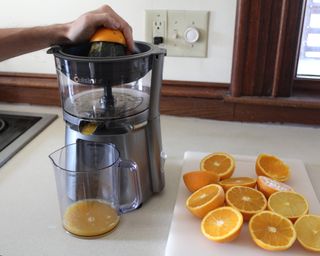
After they were done juicing, they cleaned each model, noting whether it needed to be hand-washed or could be run through the dishwasher. They also evaluated how much space each orange juicer took up in storage, as well as its weight and how easy it was to move around.
How we picked
We picked the top products based on how easy the machines were to use, how much juice each juicer produced, and the overall performance of each one. We also considered the size, weight, materials, cost, and easy of cleaning of each machine. Only juicers that got four stars or more (out of five) made the final cut.

Camryn is a freelance writer and product reviewer who has been testing small kitchen appliances (as well as other home goods) for several years. She’s tested everything from toasters to oil infusion machines, and she spent a few weeks drinking lots of orange juice when she was working on this buying guide.

Christina Chrysostomou is our acting head of ecommerce and tests the majority of our small kitchen appliances. She tested several citrus juicers and compared them on power, materials, ease of use, and ease of cleaning.
If you've decided you want a healthy beverage with all the 'bits' in, buying one of the best blenders might be the better option for you, as it includes more pulp (and fiber) in the final result. Our guide has a real mix of models including handheld, portable, and large-capacity appliances for smoothies, shakes, and, even soups!
Join our newsletter
Get small space home decor ideas, celeb inspiration, DIY tips and more, straight to your inbox!

Camryn Rabideau is a writer and product reviewer specializing in home and kitchen products. In her five years as a product tester, she's tested hundreds of items first-hand, including many, many kitchen appliances for Real Homes, and also works on our sister brand, Homes & Gardens. Camryn does her product testing from her small homestead in beautiful Rhode Island. Her work appears in publications such as Forbes, USA Today, The Spruce, Food52, and more. When she’s not tinkering around with the latest home gadgets, she spends her time tending to her animals, working in her garden, or crafting.
- Christina ChrysostomouFormer acting head ecommerce editor